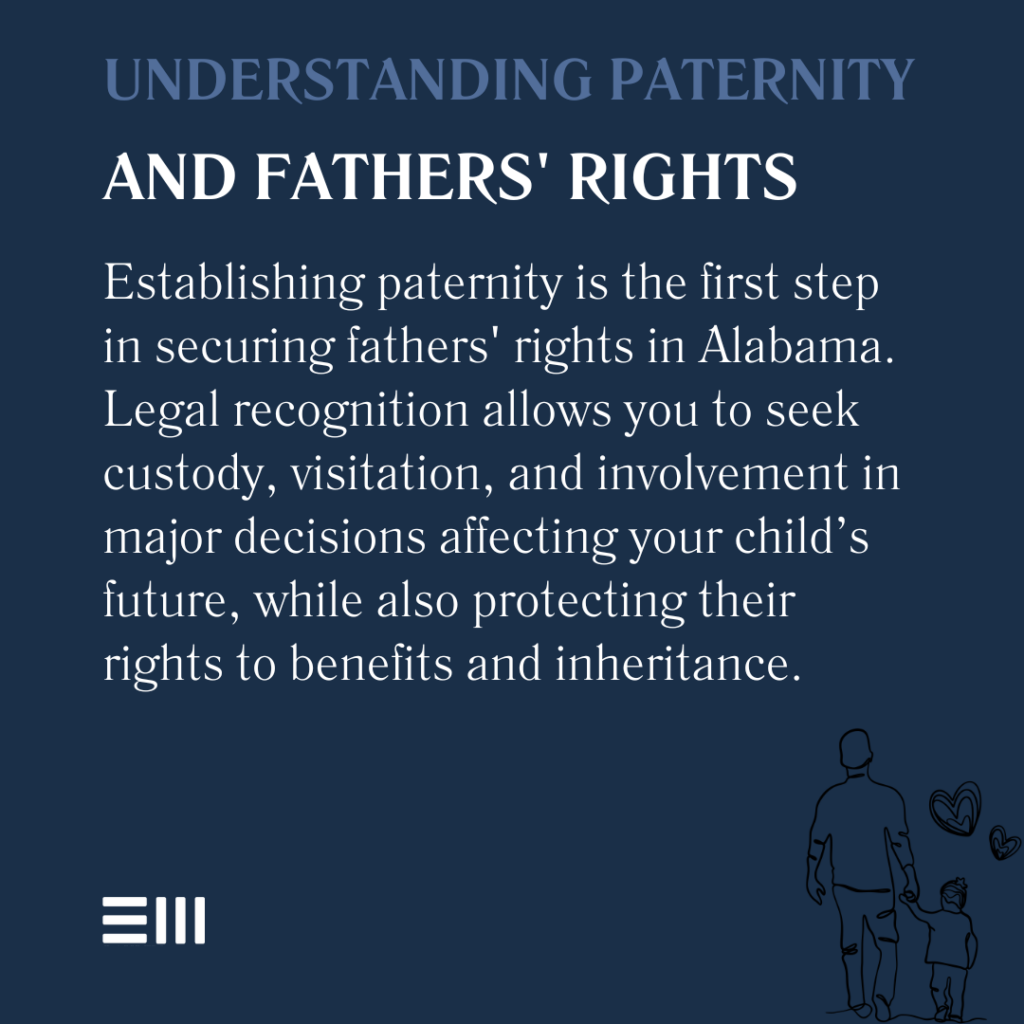
Every child deserves a strong relationship with both parents. Gone are the days when courts automatically favored mothers in custody decisions.
Modern Alabama family courts recognize the vital role fathers play in their children’s development, from daily nurturing to long-term emotional support.
As more fathers actively pursue their parental rights, understanding the legal landscape becomes essential for protecting these precious parent-child bonds.
Understanding Fathers’ Rights in Alabama
Alabama courts aim to protect the best interests of children by ensuring both parents can maintain meaningful relationships with their children.
From establishing paternity to securing fair custody arrangements, fathers have specific legal rights and protections under Alabama law. These rights extend across all aspects of parenting, including decision-making authority, visitation schedules, and input on major life choices affecting their children.
The courts recognize that a father’s involvement provides unique contributions to child development, from modeling behavior to offering diverse perspectives and experiences that shape their children’s worldview.
The evolution of family law in Alabama reflects a growing recognition that children benefit most when both parents remain actively involved in their lives. This shift acknowledges the essential role fathers play in their children’s emotional, social, and academic development.
Research consistently shows that children with involved fathers perform better in school, develop stronger social skills, and demonstrate greater emotional stability.
Understanding your rights as a father helps ensure you can effectively advocate for your role in your children’s future and maintain the kind of meaningful relationship that supports their healthy development.

Frequently Asked Questions About Fathers’ Rights in Alabama
Every father’s situation brings unique challenges and opportunities.
These questions address the most common concerns Alabama fathers face when navigating their parental rights and responsibilities.
How Do I Establish Paternity in Alabama?
Establishing paternity creates the legal foundation for fathers’ rights. Several methods exist:
- Voluntary acknowledgment at birth;
- Signing a Declaration of Paternity form;
- DNA testing through the courts;
- Administrative paternity orders;
- Legitimation through marriage to the mother; and
- Court-ordered paternity determination.
Proper paternity establishment opens the door to all parental rights and responsibilities. This legal recognition forms the basis for pursuing custody, visitation, and other parental privileges while also protecting your children’s rights to inheritance and benefits.
What Rights Do Unmarried Fathers Have?
Unmarried fathers face specific considerations when asserting their parental rights:
- Need for legal paternity establishment;
- Rights to seek custody and visitation;
- Child support obligations and rights;
- Access to medical and educational records;
- Right to be involved in major decisions; and
- Ability to seek emergency custody if needed.
Understanding these rights helps unmarried fathers take appropriate steps to protect their relationships with their children. Courts focus on the children’s best interests regardless of marital status.
How Can Fathers Get Joint Custody in Alabama?
Several factors influence custody decisions in Alabama:
- History of involvement with the child;
- Ability to provide stable environment;
- Work schedule flexibility;
- Relationship with the other parent;
- Geographic proximity to the child;
- Support system and resources;
- Child’s relationship with both parents; and
- Physical and mental health status.
Courts evaluate these factors to determine custody arrangements that serve children’s best interests. Demonstrating active involvement and parenting capability strengthens fathers’ positions in custody determinations.

What Visitation Rights Do Fathers Have?
Visitation rights encompass various aspects of parent-child contact:
- Regular scheduled visitation times;
- Holiday and special occasion arrangements;
- Virtual visitation options;
- Right to attend school events;
- Access to extracurricular activities;
- Make-up time for missed visits; and
- Communication between visits.
Understanding and exercising these rights helps maintain strong bonds with your children. Consistent involvement demonstrates a commitment to your parental responsibilities.
Modern technology offers additional opportunities for maintaining connections through video calls, shared online calendars, and digital photo sharing.
Many Alabama courts now recognize these virtual interactions as valuable supplements to physical visitation, especially when work schedules or distance creates challenges.
How Can I Modify an Existing Custody Order?
Modification requests require specific elements:
- Material change in circumstances;
- Evidence supporting the change;
- Best interests consideration;
- Current situation documentation;
- Proposed new arrangement details;
- Impact on the child’s stability; and
- Other parent’s position.
Courts carefully weigh modification requests to ensure changes benefit the children. Proper documentation and clear reasoning support successful modifications.
What Rights Do Fathers Have Regarding Child Support?
Child support involves both obligations and rights:
- Right to fair income calculation;
- Consideration of both parents’ earnings;
- Modification rights when circumstances change;
- Access to payment records;
- Right to contest incorrect amounts;
- Credit for direct child expenses; and
- Tax implications understanding.
Understanding these rights helps fathers ensure fair support arrangements while maintaining financial stability. Proper documentation supports both payment and modification requests.
How Do I Protect My Rights During Divorce?
Protecting your rights during divorce requires specific actions:
- Document involvement with children;
- Maintain detailed financial records;
- Follow court orders precisely;
- Keep communication records;
- Attend all court appearances;
- Meet all support obligations; and
- Avoid negative interactions.
Taking these steps helps preserve your rights while demonstrating responsible parenting. Professional guidance often proves valuable during this process.
Many fathers find that maintaining detailed records of their involvement, including photographs, text messages, emails, and receipts, provides crucial evidence of their commitment to their children’s well-being.
This documentation can prove invaluable if disputes arise about custody or visitation arrangements.
What Rights Do Fathers Have in Education and Healthcare?
Parents’ rights regarding children’s welfare include:
- Access to educational records;
- Participation in school decisions;
- Medical records access;
- Input on healthcare choices;
- Emergency contact status;
- Right to attend appointments; and
- Involvement in major decisions.
Understanding and exercising these rights helps fathers maintain active roles in their children’s development.
Clear communication with schools and healthcare providers supports involvement. Many fathers find success by proactively establishing relationships with teachers, doctors, and other professionals involved in their children’s lives.
Setting up direct communication channels and regularly participating in appointments and meetings demonstrates your commitment to staying informed and involved in all aspects of your children’s growth and development.
Your role as a father extends beyond legal rights to the lasting impact you have on your children’s lives. Understanding and asserting these rights helps ensure you can fulfill your parental responsibilities effectively.
Securing Your Role as a Father
Every child benefits from having an involved, dedicated father in their life. Our experienced team understands the unique challenges fathers face in the Alabama legal system and can help you protect your parental rights.
Contact us today to discuss your situation and develop a strategy that supports your relationship with your children.
Take advantage of our extensive experience with fathers’ rights cases in Alabama.
Can't find what you're looking for? Search our site below.










